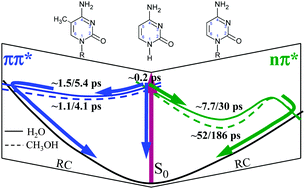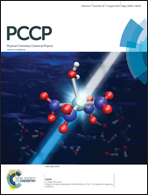Remarkable effects of solvent and substitution on the photo-dynamics of cytosine: a femtosecond broadband time-resolved fluorescence and transient absorption study†
Abstract
Cytosine (Cyt) among all the nucleic acid bases features the most complex and least understood nonradiative deactivation, a process that is crucially important for its photostability. Herein, the excited state dynamics of Cyt and a series of its N1- and C5-derivatives, including the full set of Cyt nucleosides and nucleotides in DNA and RNA and the nucleosides of 5-methyl cytosine, 5-methylcytidine and 2′-deoxy-5-methylcytidine, have been investigated in water and in methanol employing femtosecond broadband time-resolved fluorescence coupled with fs transient absorption spectroscopy. The results reveal remarkable state-specific effects of the substitution and solvent in tuning distinctively the timescales and pathways of the nonradiative decays. For Cyt and the N1-derivatives, the nonradiative deactivations occur in a common two-state process through three channels, two from the light-absorbing ππ* state with respectively the sub-picosecond (∼0.2 ps) and the picosecond (∼1.5 ps) time constant, and the third is due to an optically dark nπ* state with the lifetime ranging from several to hundreds of picoseconds depending on solvents and substitutions. Compared to Cyt, the presence of the ribose or deoxyribose moiety at the N1 position of N1-derivatives facilitates the formation of the nπ* at the sub-picosecond timescale and at the same time increases its lifetime by ∼4–6 times in both water and methanol. In sharp contrast, the existence of the methyl group at the C5 position of the C5-derivatives eliminates completely the sub-picosecond ππ* channel and the channel due to the nπ*, but on the other hand slows down the decay of the ππ* state which after relaxation exhibits a single time constant of ∼4.1 to ∼7.6 ps depending on solvents. Varying the solvent from water to methanol accelerates only slightly the decay of the ππ* state in all the compounds; while for Cyt and its N1-derivatives, this change of solvent also retards strongly the nπ* channel, prolongs its lifetime from such as ∼7.7 ps in water to ∼52 ps in methanol for Cyt and from ∼30 ps in water to ∼186 ps in methanol for deoxycytidine. The spectral signatures we obtained for the ππ* and the nπ* states allow unambiguous evidence for clarifying uncertainties in the excited states of Cyt and the derivatives. The results provide a unifying experimental characterization at an improved level of detail about the photophysics of Cyt and its analogues under biologically relevant conditions and may help in understanding the photostability as well as photo-damages of the bases and related DNAs.


 Please wait while we load your content...
Please wait while we load your content...